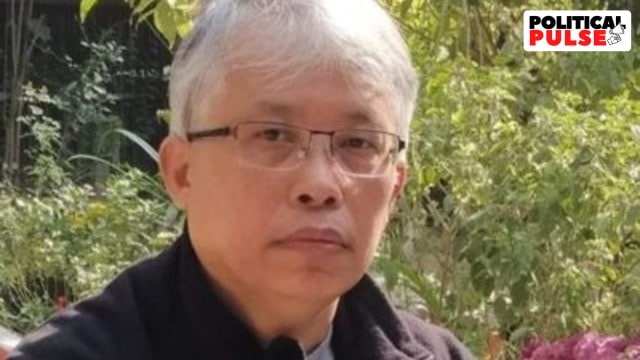JNU professor fielded by Congress in Inner Manipur: ‘Partition being practised in Manipur… State itself polarising society’
“One of the most important problems facing Manipur is the estrangement between communities. And part of that is also to make certain that communities realise that not distinguishing foreigners from Indian citizens is also a disservice to the nation,” says Angomcha Bimol Akoijam
 Since the start of the ethnic conflict in the state last May, Akoijam has been a vocal critic of the government’s handling of the conflict. X/A. Bimol Akoijam
Since the start of the ethnic conflict in the state last May, Akoijam has been a vocal critic of the government’s handling of the conflict. X/A. Bimol AkoijamAn associate professor at Jawaharlal Nehru University’s School of Social Sciences, Angomcha Bimol Akoijam is an unlikely politician. In this election, he is making his political debut as the Congress candidate from the Inner Manipur constituency.
Since the start of the ethnic conflict in the state last May, Akoijam has been a vocal critic of the government’s handling of the conflict. In an interview with The Indian Express, he talks about why he entered politics, and the issues facing the state, from the Meitei-Kuki violence to illegal migration. Excerpts:
What prompted you to join politics?
I come from that tribe called academics and I have my own set of heroes. Gloria Steinem… Michel Foucault, Noam Chomsky, Jean-Paul Sartre… They were involved in political issues… I would come out and distribute pamphlets in market places during elections. I spoke out during the Armed Forces (Special Powers) Act (Afspa) movement and one of my nicknames remains ‘Afspa Man’.
I used to criticise (former three-term Congress Chief Minister) Okram Ibobi and tamo (elder brother) Biren Singh used to be close to me. But when (Biren) became the CM, after six months, I wrote in the Imphal Free Press (a popular English newspaper in Manipur) that the honeymoon period was over for the BJP.
We haven’t seen a situation like this in our entire history… If a communal riot happens, what do we do? We ensure that the affected people are protected. We have seen Muslim colonies being guarded with the full force of the State so that nothing happens there… Where the State was either complicit or failed to perform its role was the case of the Kashmiri Pandits, and this time Manipur… Why is it that Meiteis were shifted out of Churachandpur? Why is it that you try to inject this narrative that there is no Kuki in the (Manipur) valley and there are no Meiteis in the hills? Partition is being practised here. What happened in 1947 is what the Indian State is doing here…
There were (Kuki) people in well-protected areas (of Imphal) even after the conflict started… It was only in September, four months later, that the last family was shifted out (by the State). Is the Indian State, with so much military power, helpless to protect 24-25 people in a tribal colony? My feeling is it (was) a jarring (blow) to your narrative of there being no Kuki in the valley… so you shifted them out. This segregation is planned.
You keep on consolidating the separation… At my first public address in Jantar Mantar, I said do not blame the Kuki community as a whole, blame the elites and their divisive politics… So I feel that I must change this narrative… it will have more weight as an MP.
If elected, what steps do you intend to take to address the situation?
One of the things is to change the narrative. That is why in the Congress manifesto, we have the word ‘reconciliation’. In a society that is fractured and where there is estrangement in inter-community relationships, you need reconciliation… My step would be to accentuate this process of reconciliation.
The BJP is talking about scrapping the Free Movement Regime (FMR) with Myanmar and fencing the border as solutions.
What they should have done was a simple thing. If I become an MP – and even if I do not – I will tell them publicly, ‘Do not polarise the society.’ Fundamentally, you must address estrangement. I do agree that there is a need to distinguish citizens from non-citizens. Everybody has to support the National Register of Citizens (NRC). As long as you believe in a nation state, you can’t allow every Bengali from Bangladesh and every Punjabi from Lahore to come in. Then you have to have a humane way of dealing with them as well…
One of the most important problems facing Manipur is the estrangement between communities. And part of that is also to make certain that communities realise that not distinguishing foreigners from Indian citizens is a disservice to the nation…
So this is one part of it, but the reconciliation process is essential. Any form of politics that tries to polarise and tries to thrive on it must be countered.
Haven’t the issues of NRC and illegal migration themselves become polarising?
That is why the people must be asking, ‘Do you believe in the idea of citizenship? Should non-citizens be allowed to come in and take advantage of various schemes that citizens share?’ I don’t think so.
There is also some resistance to the idea of elections at a time like this.
Yes, especially among people in relief camps… Where livelihood and dignity is not secured, why would you talk about the right to vote? If the people in the relief camps say it, I have nothing to argue against them.





- 01
- 02
- 03
- 04
- 05


























